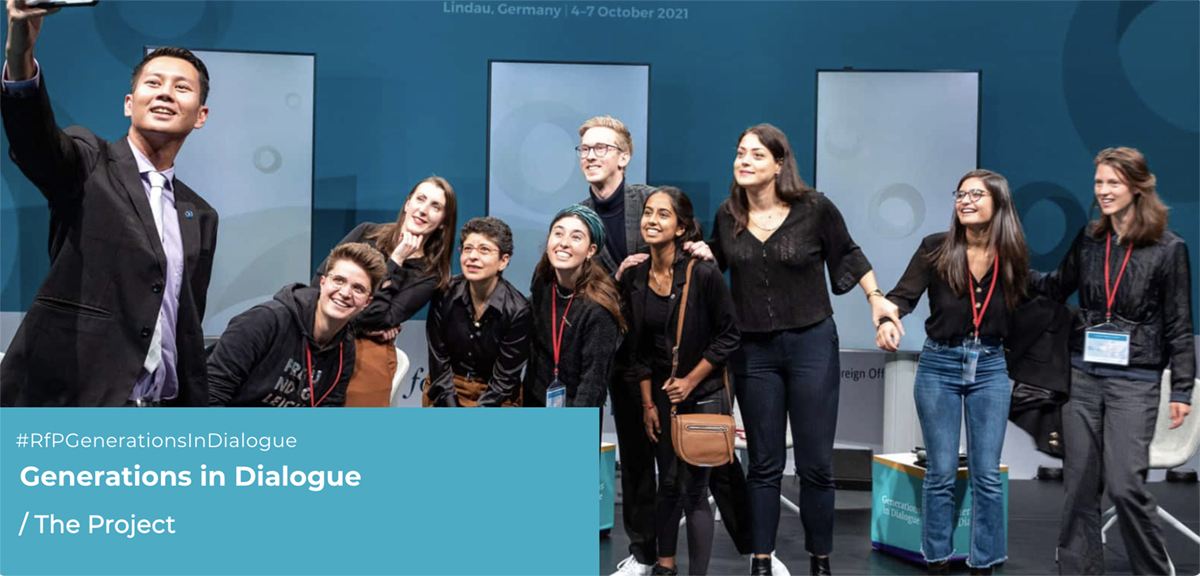GSI President Jonathan Granoff presented a speech at the Conference of the World Council of Religious Leaders on Faith and Diplomacy: Generations in Dialogue.” held October 4-7 in Lindau, Germany. The conference was produced by Religions for Peace and Ring for Peace, supported by the Religion and Foreign Policy Department of the German Foreign Office.
The Initiative was very well received and its principles will be presented soon at the Parliament of the World’s Religions. If you are engaged in any institution which takes its moral responsibilities to support human security and a sustainable future seriously, such as a religious organization, college or university, we urge your attention to the proposal. Further we urge your attention to the short explanation of the purpose of the conference by Dr. Azza Karam, President of Religions for Peace. It is inspiring.
The Lindau Initiative:
RESPONSIBLE INVESTING FOR A SUSTAINABLE FUTURE
Jonathan Granoff, President Global Security Institute
Presented at Conference of World Council of Religious Leaders on Faith and Diplomacy: Generations in Dialogue
Lindau, Germany
A proposal to bring traction to noble sentiments to save the climate, advance human rights and human security.
It is time that institutions of higher calling which have moral legitimacy and from which moral leadership for society is needed use their financial resources in a manner consistent with their values. They should only invest in enterprises consistent with human security and a sustainable future. How else can they advance intergenerational solidarity?
Would the funds of any major religious institution invest in pornographic films protected by laws protecting freedom of expression and which are thus fully legal? Unlikely, on grounds that such a use of resources would be morally repugnant. Should not gross violations of human dignity and rights, environmentally irresponsible behavior, and creating weapons of mass destruction be similarly repugnant? We call upon all faith based and religious institutions to become responsible investors. A secular state can serve as an example of a coherent and successful model.
The Norwegian Example
Norway received a windfall of profits from fossil fuels and decided that it should not squander the money but invest it for future generations. The fund is now is excess of $1.2 Trillion and is the largest sovereign wealth fund in the world. It is an inspiring example of doing good and doing well.
In the autumn of 2002, the Government appointed a committee to propose ethical guidelines for the Government Petroleum Fund. As the Graver fund reports: The ethical guidelines for the Government Petroleum Fund are based on two premises: “The Government Petroleum Fund is an instrument for ensuring that a reasonable portion of the country’s petroleum wealth should benefit future generations. The financial wealth must be managed with a view to generating a sound return in the long term, which is contingent on sustainable development in the economic, environmental and social sense.
The Fund’s financial interests should be consolidated by using the Fund’s ownership interests to promote sustainable development. The Government Petroleum Fund should not make investments which constitute an unacceptable risk that the Fund may contribute to unethical acts or omissions, such as violations of fundamental humanitarian principles, serious violations of human rights, gross corruption or severe environmental degradation.”
Accordingly, the Fund implemented the following mechanisms to implement the Ethical Guidelines:
- Exercise of ownership rights in order to promote long-term financial returns based on the UN’s Global Compact and the OECD Guidelines for Corporate Governance and for Multinational Enterprises. • Negative screening of companies from the investment universe that either themselves, or through entities they control, produce weapons that through normal use may violate fundamental humanitarian principles. • Exclusion of companies from the investment universe where there may be an unacceptable risk of contributing to: • Serious or systematic human rights violations, such as murder, torture, deprivation of liberty, forced labor, the worst forms of child labor and other child exploitation • Grave breaches of individual rights in situations of war or conflict Severe environmental degradation • Gross corruption • Other particularly serious violations of fundamental ethical norms • The moral underpinnings of such an initiative are well-established.
The Norwegian Ministry of Foreign Affairs and its Parliament are proud of this project. They should be. It is an inspiration for those who care about a sustainable future.
RESOURCES
A summary of the Guidelines and Mechanism implemented by the Norwegian Government: https://www.regjeringen.no/en/dep/fin/Selected-topics/the-governmentpension-fund/responsible-investments/The-Graver-Committee—documents/The-Graver-Committee-and-Ethical-Guideli.html? id=434926# Longer version of the Norwegian Government’s White Paper outlining the guidelines: https://www.regjeringen.no/en/dep/fin/Selected-topics/the-government-pensionfund/responsible-investments/The-Graver-Committee—documents/Report-on-ethicalguidelines. html? id=420232
What We Should Do
There are many people who are passionate about protecting the environment, people, and rights and obtain health, security and ensure freedom. When our energies are unified and amplified we will change the political dialogue to a new set of realistic values and thus policies consistent with a sustainable future. We need examples of practices that can succeed in giving people back a sense of empowerment. Cynicism and apathy are dangerous but activism and success enliven the spirit.
It is inspirational that a secular state, Norway, has advanced the moral imperative of sustainability in the interest of this and future generations. For those who believe that obligations to honor the creation arise from duties toward the Creator or a sense of responsibility to future generations what Norway has done is inspirational.
Institutions with a moral mandate, especially religions institutions, should bring their values and investment policies into coherence. Investments in companies that benefit from environmental degradation and weapons of indiscriminate effect can be moved into industries aligned with enterprises that advance sustainable practices, or at least do no harm.
An advocacy project on responsible investing will at a minimum stimulate principled debate, thus giving people in these institutions a proper sense of their moral agency. It might even succeed in moving money into practical and profitable endeavors that advance sustainable human security.
This will also help fuel better industries. If we can stimulate and facilitate a responsible investments for a sustainable future campaign in religious institutions it could stimulate the engagement of millions of individuals worldwide and raise awareness considerably.
The Norwegian pension fund can serve as an example for rational and economically successful guidelines. The campaign suggested will put forward the proposition that morally founded institutions must not invest in such a manner as to encourage activities which are against sustainability. It will advance the idea that we have duties to future generations and that environmentally irresponsible practices and the use of weapons of indiscriminate effect (land mines, cluster munitions, nuclear, biological and chemical weapons) are morally and practically unsustainable.
There is already a widely recognized movement to advance environmentally sustainable business practices and, as the Norwegians have so insightfully pointed out, there is a relationship in values and practice to the growing movement to eliminate weapons of indiscriminate effect, especially nuclear weapons.
We must now put into place legal, verifiable, and enforceable mechanisms based on our shared moral values to outlaw all weapons of indiscriminate effect. Chemical and biological weapons have been so classified, and nuclear weapons must become so. Raising public awareness by advocacy for practical change will help. Causing millions to take a position and engage will stimulate such awareness.
Destroying the very climate of the planet through greed cannot be justified by any morally based institution and their investments should reflect this truth. Threatening to destroy civilization through the use of nuclear weapons is an immoral, irrational, illegal, and expensive pursuit unworthy of civilization. It is folly to think that by accident, madness or design the weapons will not ever be used.
A morally-based investment campaign will raise consciousness and be of benefit to socially responsible financial institutions as well. It will amplify the engagement of citizens in the security debate.
Where money is used values are expressed. Institutions designed to honor compassion, conscience, reverence for the Creator, and love have a responsibility to express their values in their use of money. This proposal is designed to achieve this goal.
Some Notes on a Campaign for Responsible Investing in a Sustainable Future
Goal: Empower youth and members of faith based communities world wide to express themselves on the core existential threats that challenge humanity.
Problems Addressed:
- Ennui, frustration, ignorance, cynicism, and apathy in sectors of the population that could be inspired, active, moral voices for reason if they had the capacity to express their values on issues.
- Directing capital to worthwhile businesses
Presently, intelligent people, especially young people, are increasingly frustrated by the deluge of information on the destruction of the global commons — the living systems upon which civilization depends such as the oceans, the rainforests, and the climate – the increasing divide between rich and poor, and the horrific threat nuclear weapons pose to civilization.
These issues are large and complex and require new levels of global governmental cooperation. Individuals feel powerless when they think about them. We aim to help change this.
When people have an ability to express their higher values, when they have moral agency, they learn, they act, they create, and they change the world.
This campaign is designed to stimulate that process. There should be a committed group of leaders arising out of the deliberations at Lindau to come together soon for the first strategy session to make this proposal a reality.
The Norwegian Divestment Campaign:
https://www.gsinstitute.org/pnnd/updates/update22docs/NuclearDivestment.pdf
A summary of the Guidelines and Mechanism implemented by the Norwegian Government: https://www.regjeringen.no/en/dep/fin/Selected-topics/the-government-pension-fund/responsible-investments/The-Graver-Committee—documents/The-Graver-Committee-and-Ethical-Guideli.html?id=434926#
Longer version of the Norwegian Government’s White Paper outlining the guidelines:
RESPECTFULLY SUGGESTED,
JONATHAN GRANOFF, PRESIDENT GLOBAL SECURITY INSTITUTE
Jonathan Granoff is the President of the Global Security Institute, a representative to United Nations of the World Summits of Nobel Peace Laureates, a former Adjunct Professor of International Law at Widener University School of Law, and Senior Advisor to the Committee on National Security American Bar Association International Law Section.








